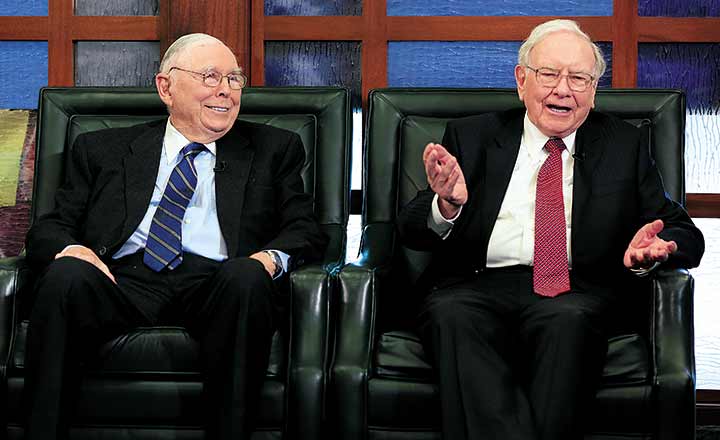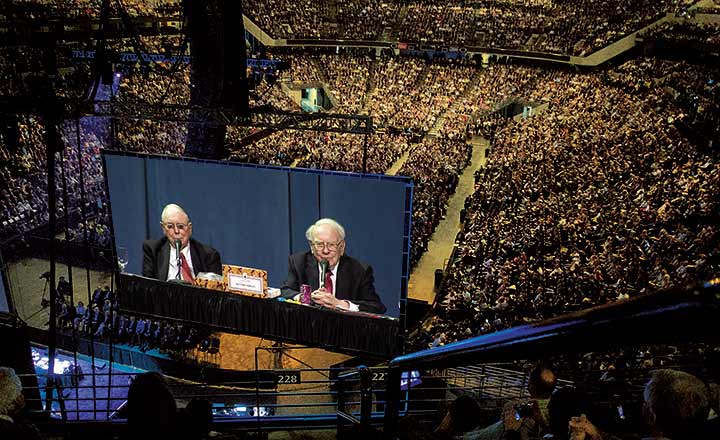On Microeconomics and Macroeconomics
>>> Berkshire does not make investment decisions based on macroeconomic factors, but do you have good microeconomic indicators from Berkshire’s many businesses?
Warren Buffett: Charlie and I read a lot. We are interested in economic and political matters, and are familiar with almost all macroeconomic factors. We don’t know where zero interest rates are going to lead, but we do know what’s going on.
Buying businesses and stocks are similar decisions. We try to know as many microeconomic factors as we possibly can. I like looking at the details of a business whether we buy it or not. I find it interesting to study the species.
Charlie Munger: There could hardly be anything more important than microeconomic factors. That is business. Business and microeconomics is sort of the same term. Microeconomics is what we do and macroeconomics is what we put up with.
Anchoring Bias
>>> How do you deal with the anchoring effect?
Warren Buffett: When we bought See’s Candies in 1972, there may have been 140 shops. We looked at the numbers on each one and watched them over time. Some of the information is useful. Some of it may look like it’s not helpful. But who knows when some little fact might pop up and make a difference? We love doing this. It is like watching a baseball game. Every pitch is interesting, whatever it may be. That’s what our activity is.
Charlie Munger: We try to avoid the worst anchoring effect, which is always the previous conclusion. We really try to destroy our previous ideas.
Warren Buffett: Charlie says if you disagree with somebody, you ought to be able to state their case better than they can. At that point, you’ve earned the right to disagree with them.
Charlie Munger: Otherwise, you should just keep quiet. It would do wonders for our politics if everybody followed my system.
On Investing
>>> What elusive truth has allowed you to think ahead of the crowd?
Warren Buffett: I owe a great deal to Ben Graham in terms of investing. When it comes to business, I owe a great deal to Charlie. I spent a lifetime looking at businesses and why some work and why some don’t work…pattern recognition. As Yogi Berra said, “You can see a lot just by observing.” That’s pretty much what Charlie and I have been doing for a long time. It is important to recognise what you can’t do. We’ve generally tried only to swing at things in our particular strike zone. It’s really not much more complicated than that. You don’t need the same IQ in the investment business that you need at certain activities in life. You do need emotional control. We’ve seen very smart people do very stupid things with unnecessary risks. People do it time after time, self-destructive behavior of one sort or another. It doesn’t take a genius to do it, but I think we sort of have managed to avoid this self-destructive behaviour.
Charlie Munger: There are a few tricks that work well. Temperament that has a combination of patience and opportunism in it is one. I think it’s largely inherited, but it can be learned to some extent. Another factor that Berkshire has done so well is we really try to behave well. When my great-grandfather died, the preacher said, “None envied this man’s success so fairly won and wisely used.” That’s exactly what Berkshire is trying to do. There are a lot of people that made a lot of money, and everybody hates them. They don’t admire the way they earned the money. I don’t believe in the gambling business. We’ve turned down businesses, including a big tobacco business. I don’t think Berkshire Hathaway would work so well if it were just terribly shrewd. We want to have people think of us as having won fairly. It works.

Due Diligence On Deals
>>> Is your due diligence process, which is speedy and usually done within days, an advantage or risk on deals?
Warren Buffett: I get that question often from lawyers. We’ve made plenty of mistakes in acquisitions as well as in not making acquisitions. Mistakes are always about making a proper assessment of the economic conditions or the future of the company. They are not the things on the checklist.
What counts is whether you really have a fix on the basic economics or how the industry is going to develop or whether Amazon is likely to kill them in a few years. We’ve not found a due diligence list that gets at what we think are the real risks when we buy a business. We have made at least half dozen mistakes and maybe more when you talk about mistakes of omission. None of those would have been cured by a lot more due diligence, but may have been cured by us being a little smarter. Assessing a manager, who I’m going to hand a billion dollars to for his business as he hands me a stock certificate, assessing whether he’s going to behave differently in running the business than in the past when he owned it, that’s incredibly important. So, if we thought there were items of due diligence, there are a few that get covered, but if we thought there were things that were missing, which were important in assessing the future economic prospects of the business, we would by all means drill down on those.
When we bought See’s, we probably had 150 leases. When we bought Precision Castparts, there were 170 plants and pollution problems at some places. However, the individual plants were not important, but the business prospects 10-20 years from now is.
I do think it probably facilitates things, with at least certain people, that our method of operation does cut down due diligence. You get into squabbles on small things — I’ve seen deals fall apart because people start arguing about some unimportant point. Their egos get involved. They draw lines in the sand. When we start to make a deal, it usually gets done.
Charlie Munger: Business quality usually counts for something more than whether you crossed the T on some old lease. The human quality of management that is going to stay back is very important. How will you check that by due diligence? I don’t know anyone who has had a better record than Berkshire in judging business and the human quality. I don’t think it would have improved at all by using some different method. We are doing it the way we should.
Warren Buffett: Negotiations that drag out tend to blow up. People can get obstinate about small points. It’s silly to get obstinate, but people get silly sometimes. I like to keep things moving, and I like to show a certain amount of trust because, usually, trust comes back to you. The truth is there are some bad apples out there. Spotting them will not come from looking at the documents. You really have to size up how the person, who is getting a lot of cash from you, will behave in the future because you are counting on them. That assessment is as important as anything involved. We know all the figures going in and what we will pay. We don’t want things to get gummed up in negotiation. If I have the deal in the right terms, I don’t believe in winning every point. Tom Murphy taught me not to try to win every point in deal making. Make a decent deal. If you think it is bad faith, it gives an indication of the character you’re dealing with, then you have another problem. You’re lucky if you find that out early.
Charlie Munger: How many people in this room, who are happily married, carefully checked their spouse’s birth certificate? My guess is our methods are not as uncommon as they appear.
Warren Buffett: I’ll think about that.
Zero and Negative Interest Rates
>>> When interest rates go from zero to negative in a country, how does that affect valuation?
Warren Buffett: Going from, which we haven’t done yet in this country yet, going from 0% to -½%, it’s really no different than going from 4% to 3 ½%. It has a different feel to it if you have to pay a half a point to somebody. If you have your base rate reduced by half a point, it’s of some significance, but it’s not dramatic. What’s dramatic is the low interest environment generally. We have been in a low interest rate situation for a long time, longer than I would have anticipated. You will pay more for a business when interest rates are zero than when they are 15% when Paul Volcker was around. Very cheap money makes me pay a little more for businesses than when money was available at what we thought was the normal interest rate then. Very tight money would cause me to pay somewhat less.
We had a rule for 2,600 years — Aesop — and it was that a bird in the hand is worth two in the bush. A bird in the hand now is worth about 9/10th of a bird in the bush in Europe. These are very unusual times. If you asked me if I paid a little more for Precision Castparts because interest rates are around zero than if they had been 6%, then the answer is yes. I try not to pay too much more, but it has an effect. If interest rates continue at this rate for a long time it will have an enormous effect on asset value.
Charlie Munger: I don’t think anyone knows much about negative interest rates. We never had them before. We never had periods of stasis, except for the Great Depression. We didn’t have things like what happened in Japan, great modern nation playing monetary tricks, stimulus tricks, mired in stasis for 25 years. None of the great economists that studied this and taught it to our children understand it either. We just do the best that we can.
Warren Buffett: They still don’t understand it.
Charlie Munger: Our advantage is that we know we don’t understand it.
Warren Buffett: It makes for an interesting movie. It does modestly affect what we pay for businesses — I don’t think anyone expected it to last this long.
Charlie Munger: If you are not confused by negative interest rates, you did not think about it correctly.
Compensation Incentives
>>> The power of incentives — how will you compensate the next Berkshire CEO?
Charlie Munger: I wouldn’t worry about the next CEO. Our incentive systems are different. They try to adapt to the reality of each situation. Basic rule is you get what you’re rewarded for. If you have a dumb incentive system, you get dumb outcomes. One of our really interesting incentive systems is at GEICO. We don’t have a normal profit type of incentive there.
Warren Buffett: At GEICO, we have two variables. They apply to well over 20,000 people. You have to be there a year. Anyone that’s been there a year knows these two variables will determine the bonus compensation. As you go up the ladder, it has a multiplier effect. It gets to be larger and larger in terms of bonus compensation as a percentage of your base. And it’s always significant.
I care about growing the business and I care about growing it into a profitable business. We have a grid, which consists of the growth in policies in force, on one axis, and then on the other grid, the profitability of the seasoned business. It costs a lot of money to put a business on the books. We spend a lot of money on advertising. The first year, we put any business on the books, it’s going to reduce profits. I don’t want people to worry about the profit that might be impaired by growing the business fast. It totally aligns the goals of the organisation in terms of compensation with the goals of the owner.
Charlie Munger: Others might reward just profits. They don’t take on new business because it hurts profits. You need to think things through, and Warren is good at designing incentive compensation plans.
Warren Buffett: Do you reward profits? It would be the dumbest thing you could do. You quit advertising and start shrinking the business a little. People know the very top person is getting paid based on the same two variables. They don’t think the guys at the top have a cushy deal compared to them. The interesting thing is that if we brought in a compensation consultant, they would come up with plans designed for all of Berkshire. The idea of having sort of a coordinated arrangement for incentive compensation across 70 or 80 businesses is totally nuts. If we got in somebody, they would be thinking in terms of some master plan and sub-plans. We try to figure out what makes sense in each business that we are in. There are some businesses where the top person is enormously important and some where the business itself dominates. We try to design plans that make sense.
One fellow, he wanted to sell his business, but he also wanted to keep running it. I made a deal. I said, “Tell me what the compensation plan should be.” He said, “I thought you told me.” I said, “No. I don’t want a guy working for me that has a plan that he doesn’t think makes sense.” He told me what made sense, and we’ve been using it ever since. We never changed a word.
Charlie Munger: When it comes to incentives, a lot of bad examples come from the banking and investment banking space. If you reward someone a share of the profit, but if the profit is being reported using accounting practices that cause them to exist only on paper, then people are doing the wrong thing, and it’s endangering the bank and hurting the country. That was a major reason for the financial crisis. The banks were reporting a lot of income they weren’t making. The accounting allowed a lender to use his previous historical loss rate — an idiot could make money on giving loans with high interest, accruing interest and saying, “I won’t lose money on these since I didn’t lose it in the past.” It’s insane for the accountants to allow that. But nobody is ashamed of it.
Warren Buffett: You get the very greedy cheap executive, who wants an enormous payoff for himself. He designs a pyramid so others get paid, and it doesn’t look like he is alone in the fantastic payoff he arranged for himself. There’s a lot of misbehaviour. You saw it in the pricing of stock options. I’d hear conversations in a board room. They were issuing options at a terribly low price. You get enough people interested; they may occasionally do something that might cause it. What could be dumber than a company looking to issue shares at a low price? If you were a consultant, you would want to make people think that compensation is very complicated.
Charlie Munger: We want it simple and right. Those of you with children, if you constantly rewarded every child for bad behaviour, the house would be ungovernable in short order.
Sense of Humour
>>> In your annual shareholders letters and during interviews, your sense of humor always shines through. Where does your sense of humor come from?
Warren Buffett: It’s the way I see the world. It’s a very interesting and humorous place. I think Charlie has a better sense of humor than I do, and I will let him answer where he got his.
Charlie Munger: I think if you see the world accurately, the way it is, it’s bound to be humorous because it’s ridiculous.
Warren Buffett: Well, I think that’s a good note to close on.











